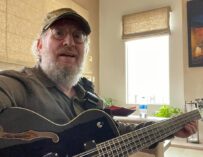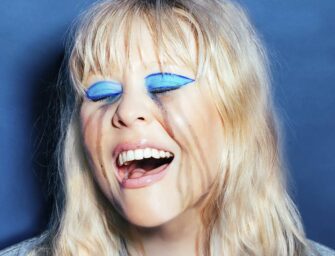
Aaron Lee Tasjan: “There’s that voice inside of you…and it’s gonna say things to you.” Photo: Curtis Wayne Millard
The Americana troubadour talks us through his influences, the making of his latest album, and the voices in his head
Americana star Aaron Lee Tasjan is quickly establishing himself as the king of piercing lyrics with sharp commentary on the state of the USA today. Born in 1986, Tasjan grew up in Ohio in a musical family, teaching himself to play the guitar at 11. By the age of 16, he was becoming a sought after guitarist for hire. In 2006, he formed the glam indie rock band Semi Precious Weapons, leaving in 2008, when he found work playing guitar with bands such as the New York Dolls.
Aaron moved to Nashville in 2013 to focus on his songwriting and a solo career. His first solo album was In The Blazes in 2015, but the real breakthrough was 2016’s Silver Tears, which won plaudits around the world. After recording in Nashville, his latest record Karma For Free was released at the end of last year and proved a great follow-up.
Aaron’s frenetic live performances have established him on both sides of the Atlantic as one of the leading new figures in Americana, so we jumped at the chance to have a chat with him…
What sort of music influenced you as you were growing up?
“For me, the music that I grew up listening to, artists like Harry Nilsson, Richard Swift and Elliott Smith; that music all came from a tradition as well, whether it was the tradition of American rock ‘n’ roll or British rock ‘n’ roll. Sometimes the two combined together in one sound. That’s my roots of music.”
I know you also loved American singer-songwriter, John Prine, as you were growing up. Has he been an influence on you?
“Well, sure. I think, particularly lyrically. The sense of humour within Prine’s music really touches me. He and a comedian, stand-up comedian named Mitch Hedberg, are probably two of my bigger lyrical influences.”
You like storytelling; is that something that you’ll continue wanting to do, that sort of thing?
“I think so. I love giving context for how the material was created. I think sometimes it can help draw the audience into the real point that you’re trying to get across, particularly in a live setting.”
Tell me about your album Karma For Free?
“Traditionally, I’ve recorded in California with friends of mine out there, this time I’ve decided to make a record at home. It’s a record that was born out of living in Nashville, really, and just hearing a lot of records that were coming out in town that were seeming a little too similar-sounding to me in a lot of ways.
The album was recorded at a friend’s garage studio. Why did you decide to go for that?
“Well, I think initially we were in a bunch of bigger, fancier studios. We found the environment to be very comfortable, but it wasn’t as rough and ready as the music wanted to be in. So I think we took what worked about those sections and built off of that once we got into the garage. But, the band that I’ve been touring about is really, it’s a garage band. We don’t have computers on stage, and we don’t play tracks or anything like that that a lot of people do nowadays. Although you don’t really see that in what would be called the ‘Americana’ genre, which is I guess what we fit into at this point. It just felt like the most authentic representation of the record.”

Aaron: “You don’t even really understand what it’s about yourself until years down the road sometimes.”
How do you feel this record differs from your last album Silver Tears?
“Well, I think aside from the production style, I think there’s definitely an effort to be a little bit more, I suppose ‘reckless’ would be the word, and I only say that, not because we don’t care, but I think you get to a place where you can care almost too much, and you don’t want it to become precious. And when you’re trying to follow up a record, you can put a lot of pressure on yourself. And I think we tried to not do that so that the energy of the record would feel inviting to people.”
You start the album Karma For Free with If Not Now When. Some people say it’s a call for action – what would you say?
“Yeah, I suppose so. I didn’t think about it too much because I think a lot of times, when you’re writing these things they come out in 10 minutes or something like that, so you don’t even really understand what it’s about yourself until years down the road sometimes.
“And you go, ‘Oh, wow, at this time in my life this was happening,’ and that must’ve been what I was subconsciously talking about or something. So, it’s kind of fun in a way because you figure yourself out through the songs over time.”
Some have suggested the song was that inspired Donald Trump?
“Not really. That guy doesn’t have anything to do with art.”
The song The Truth Is So Hard To Believe looks at how we’re bombarded with information, and the value of truth is becoming harder to see.
“Yeah, there’s definitely something to that. When I wrote it, I think I was thinking about, when you’re a singer and you’re travelling, it can be a very isolating experience – a very solitary experience. You find yourself living in your head a lot. And there’s that voice inside of you, that voice that you hear, and it’s gonna say things to you.
“Oftentimes, they’ll be either more complimentary than they should be or meaner than they should be. And it can be tough to find the truth in that. So, it’s really about, for me at that time, it was about the truth and the untruths that we tell ourselves.
“However, it’s obviously come about that it’s played into a great deal of what’s happening in the world today, and that’s what you really hope for from a song, I think. You hope that it can be more than what you intended it for, whatever that was.”
Tell me about the Karma For Free track The Rest Is Yet To Come.
“Yeah, that was something our drummer said in the band one day. I think we were driving around somewhere, and we sort of have a very sardonic way of looking at life sometimes when you’re driving around in a tin can, you know? And he just kind of very sarcastically said, “the rest is yet to come.” Of course, people usually say the best is yet to come. And I thought there was a great sense of humour in that, so I said, “If you don’t mind, I’m gonna take that line and make a song out of it, so, we can thank Seth Earnest for that one.”
One of the stand-out tracks on Silver Teas is Dime. How did that song come about?
“That song was written along with three other songs for the record on the same day.”

Aaron: “Don’t listen to anybody, keep all the money, and come from the heart.” Photo: Curtis Wayne Millard
Which other songs?
“Ready To Die, Where The Road Begins And Ends and a song called Success. I’d been playing in Omaha, Nebraska. A fan there gave me a present after a show that turned out to be a couple of hits of acid, and my roommate was out of town – I had the house to myself – so I set up a little studio in my living room hanging microphones from the chandeliers and stuff, so everything was set up, and I swallowed some acid and said: ‘Here we go.’
“And those four songs kind of popped out and they all ended up making the record. It was just an interesting experiment in creativity to kind of be aware of other things.
“That new headspace felt like something different. And at the end of the day, that’s really important to me; I don’t want to become stagnant. I think it’s one thing if you’re AC/DC and you’ve got Malcolm Young in the band, but for those of us who don’t have that luxury I think a bit of creativity, within the walls of what it is that you do, is important to developing over time and giving people a reason to continue to listen to what you’re doing.”
I must ask you about that suit. [Aaron wears a suit made of hundreds of tiny mirrors on the cover of Silver Tears and in the video for his song Memphis Rain]
“I bought the suit at a thrift store in Nashville. It was a regular green suit. I woke up one day and thought ‘I need a green suit’, I don’t know why. I bought the suit for probably like eight dollars, something like that. And I’d seen a Tom Waits thing, where he had a hat that had pieces of mirror all over it, and he was singing Old Fifty-Five.
“And they had one spotlight and it came down on him, and it bounced off all the pieces of mirror on the hat and it illuminated the entire theatre. And I just thought, ‘That’s so cool’. I wondered if there’s a way to do that with a suit, because I was so grateful to be given the opportunity to make a record for our label and all that kind of stuff at that time, and I felt like I was just radiating joy and I wanted to have a visual of that, that expressed that feeling.
“So my friend Curtis Wayne Mallard, who took the photograph for the record, came up with the idea, ‘Let’s get these mirrored sequins, and we’ll glue them all over the suit’. We did and shot the video for Memphis Rain, I think, in the springtime in Nashville. So the weather was a little overcast and kind of funky, and we went to this airfield to shoot the picture, and just then the sun kind of came through the clouds, but it was still a little overcast and the sun did everything we wanted it to do. It hit the sequins.”
Tell me about the song Memphis Rain?
“I wrote after an experience playing in Memphis, naturally. And if you’ve never been to Memphis, I always like to say, it’s not pretty but it’s beautiful, you know what I mean? So, I played this gig. I was talking to a woman before the show, and she was sort of yelling at me about Ryan Adams or something, I can’t really remember.
“But anyway, she went outside, and I had to start playing my gig and there’s a big window on the side of the club, you can see out into the street. And the guy, I’m assuming maybe her husband or boyfriend or something, pulled up on a motorcycle. And she was really yelling at him, and it started to kinda rain on them. And I thought, ‘Aww that’s really poetic’. And I sort of took that image and made a story to kind of go along with the rainy motorcycle star-crossed lovers kind of thing.”
What advice would you give to young songwriters starting out in the business?
“Don’t listen to anybody, keep all the money, and come from the heart.”
Interview: Nic Rigby (@nicrigby1 – part of Norwich band Nic Norton and the County Band – nicnortonmusic.com)
Find out more about Aaron Lee Tasjan at aaronleetasjan.com
































Related Articles